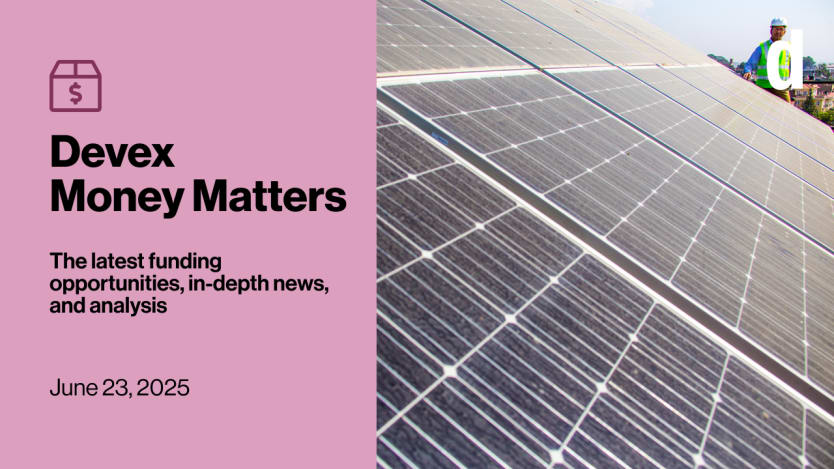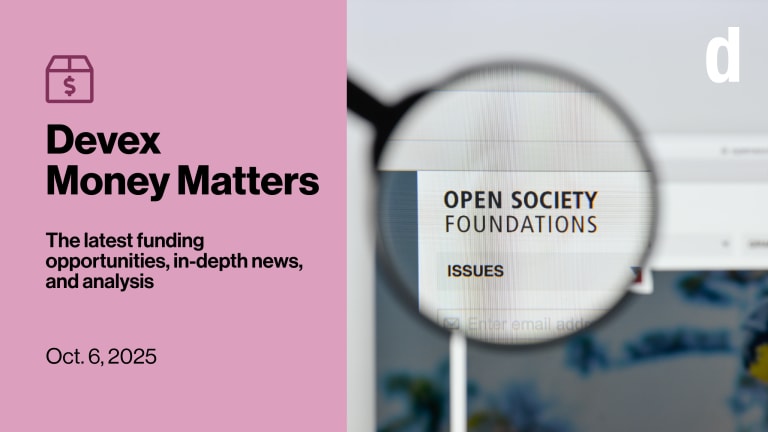
There are two big development conferences on our radar this week, both of which have major implications for the future of development funding. The Fourth International Conference on Financing for Development, or FfD4, kicks off next week in Sevilla, Spain, while we’re halfway through a major climate summit taking place in Bonn, Germany.
We’ve got news from both — as well as data analyses looking at FCDO contracts, and aid to West Africa.
+ Are there topics you want to read more about in Money Matters? We want your feedback.
Aid dropping, contracts rising
Despite continuing pressure on U.K. aid spending, the Foreign, Commonwealth & Development Office spent more on development contracts last year, our latest analysis shows — £666.8 million in the fiscal year to March 31, compared to £553.3 million the year before.
One especially interesting thing to note: More than half of the biggest contractors were U.S. operators who’ve moved to the U.K. expressly to win FCDO work. It was several years ago that these players moved to London and spent heavily on hiring staff, and for the first time, it appears that this has started to pay off.
Whether this continues, given the collapse of these organizations’ domestic market, remains to be seen.
Read: FCDO's top development contractors in 2024/25 (Pro)
+ Early next month, my colleague Raquel Alcega will be hosting the next in our series of interviews with experts on development funding. She’ll be speaking with Patricia Malila Pinheiro, director of programs at the Segal Family Foundation — a leading philanthropic funder focused on grantee-centric, trust-based approaches — on July 7 at 9:30 a.m. ET (3:30 p.m. CET). Save your spot now.
Funding activity
We publish tenders, grants, and other funding announcements on our Funding Platform. Here are some of those viewed the most in the past 10 days.
The Inter-American Development Bank is lending $250 million to drive sustainable and inclusive growth in Chile.
The International Finance Corporation has announced a partnership to increase access to finance in the cocoa sector in Ghana.
The U.S. Department of State has released a tender for the procurement of spare parts for rotary screw chillers in Montenegro.
UNICEF is looking for companies for rehabilitation work on two neonatology centers in Burundi.
The World Bank has approved a $150 million program to support clean energy transition in Sri Lanka.
+ Try out Devex Pro Funding today with a free five-day trial and explore funding opportunities from over 850 funders with the data analysis and industry intelligence you need to win them, in addition to all our exclusive analyses and news content.
Best of the West
Last year, before the collapse of USAID, we began a series looking at who provides the most development funding in different regions of the global south. We’re now restarting that series with a look at West Africa.
We found that the largest funder in the region was the United States, but given the uncertainty of future funding, our data is presented both with and without the U.S. contributions.
The second-largest funder was France, although French contributions, perhaps unsurprisingly, focused on French-speaking countries.
Earlier this year, we also produced a similar analysis of East Africa, but it’s possible you may have missed it during a rather busy period.
Read: How much aid goes to West Africa? (Pro)
ICYMI: How much aid goes to East Africa? (Pro)
+ Interested in more business and funding coverage? Explore our funding overview page. Not a Pro member yet? We offer a 15-day free trial to access all our expert analyses, insider reporting, funding data, exclusive briefings with sector leaders and influencers, and more.
4 U B4 FfD4
By the time the next edition of Money Matters hits your inbox, FfD4 will be underway. The last iteration of the conference, in 2015 in Addis Ababa, Ethiopia, set the agenda for a decade of development, and the sector must be hoping for a similarly seismic set of announcements this time around.
There are half a dozen really big issues we expect to see on the agenda, including domestic resource mobilization, international tax rules, private finance mobilization, ODA levels — and, of course, debt.
There’s already been one major announcement. The United States pulled out of negotiations around the draft text — after initially proposing more than 400 amendments — and now won’t be attending the conference at all. It remains to be seen how effectively the rest of the world can decide on development issues without the planet’s largest economy in the room.
We’ve already produced a huge amount of coverage, including preview pieces from my colleagues Elissa Miolene and Jesse Chase-Lubitz, breaking news on the negotiations from Senior Global Reporter Colum Lynch, and interviews with key experts.
Read: All the news and reporting leading up to FfD4
+ From June 29 to July 1, we will be hosting a series of events in Sevilla based at Casa Devex, a beautiful, historic Spanish villa. We’ll be interviewing key players from the conference and bringing you the updates on what’s going on. Request an invite to attend in person.
Before that, Jesse will be speaking to Rémy Rioux, head of the French development agency AFD, at 9 a.m. ET (3 p.m. CET) on Thursday, June 26, to discuss his views on DFIs and the future of finance. Register to participate here.
Bonn — but not so good
Meanwhile in Bonn, it’s much the same story. The city is currently playing host to a meeting for the United Nations Framework Convention on Climate Change, widely seen as a midway point on the journey to the main U.N. COP30 climate conference in Brazil. But the actual discussions kicked off two days late, as delegates sparred over Article 9.1 of the Paris Agreement, which deals with funds funneled from developed to developing countries.
It took two days just for delegates to decide that they weren’t going to talk about contributions from developed to developing countries, and the standoff over whether that should be on the agenda at all has pushed back everything else. Once again, the United States is not involved, and the prognosis is not good for an effective climate funding package to emerge.
Read: Climate negotiations in Bonn begin with familiar finance clash
ICYMI: The US is a no-show at Bonn climate negotiations
Sign up to Money Matters for an inside look at the biggest stories in development funding.
Search for articles
Most Read
- 1
- 2
- 3
- 4
- 5








